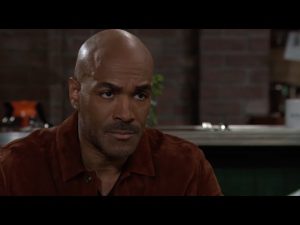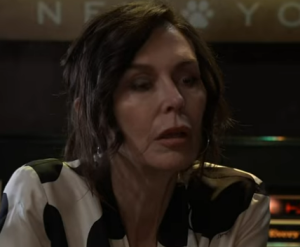The scene unfurls like a carefully preserved secret waiting to spill its truth. The air inside General Hospital feels charged, as if every fluorescent bulb hums with the possibility of something unsaid finally breaking free. It isn’t a moment of explosive drama; it’s a slow-blooming tension, the kind of suspense that creeps up the spine and settles there, insisting that the audience lean closer and listen for every whispered clue.

On this particular day, the hospital corridor isn’t merely a passage between rooms; it’s a stage where lives brush past one another with the friction of unresolved stories. Faces move in and out of focus, each one carrying a line or a smile that perhaps hides more than it reveals. The tease hanging in the air is not a single explosive revelation but a mosaic of hints, a constellation of micro-moments that suggest a larger truth hiding just beneath the surface.
You can feel the pulse of anticipation in the way dialogue barely rises above a murmur and yet seems to echo in the heart of every patient, nurse, and visitor who dares to cross the reflective tile floors. The tease promises something forthcoming—an answer, a consequence, a decision that will tilt the balance of loyalties and reshape the delicate dynamics that keep this hospital’s social world turning. It’s the kind of moment that invites speculation, that invites the mind to play detective, to assemble the fragments that are left scattered in the wake of past miscommunications and present anxieties.
Within this atmosphere, a web of connections tightens. Characters who have shared confidences and betrayed silences suddenly feel the gravity of their words more acutely. A casual remark lands with more weight than intended, a look passes between two people that reads like an unspoken pact or a hidden agenda. The tease becomes a mirror, reflecting what everyone already suspects but hasn’t had the nerve—or the permission—to voice aloud. The audience leans in, not because they crave scandal for scandal’s sake, but because they recognize the moment as a hinge that could swing doors open or shut—doors that guard intimate truths about health, vulnerability, and the fragile bonds of trust.
In the hush between scenes, a sense of urgency threads through the air. It’s a reminder that life, even in a setting governed by routines of care and recovery, can pivot on a single decision, a single revelation, a single choice to tell the truth or to allow a carefully curated lie to stand. The tease implies that something significant is simmering just within reach—a revelation about a patient’s condition, a misinterpreted symptom, a rumor that refuses to stay quiet any longer. The possibility that someone’s health could be compromised, or someone’s secret could be exposed, hangs like a low-hanging chord that could shatter the calm into fragments of shock and relief in equal measure.
Watching the interactions, you notice how courage and fear masquerade as ordinary reactions—the way a nurse’s steady hands tremble ever so slightly when a sentence almost but doesn’t quite cross the boundary into certainty; the way a friend’s smile falters when a familiar name is whispered in a tone that carries double meaning. These subtle cues are the heartbeat of the scene, the indicators that something bigger is waiting to surface. The tease isn’t simply about what’s happening today; it’s about the longer arc of the characters’ journeys—the choices they’ve made, the consequences they’ve dodged, and the truths they’ve learned to live with or conceal.

As the moment stretches, the ensemble of hospital regulars—doctors who weigh risks, nurses who manage delicate timelines, relatives who hold vigil in chairs that creak under the weight of worry—becomes a chorus of quiet suspense. Each voice adds a thread to the tapestry, and every thread contributes to a broader question: what is the cost of truth in a place built on healing? The tease hints that truth may come at a price—perhaps a confession that unsettles a relationship, a diagnosis that shifts a plan, or a revelation that demands difficult choices about care and loyalty.
The atmosphere thickens with the unspoken. People exchange glances that say as much as words, and the cameras—if one imagines them—would capture small, telling gestures: a foot tapping impatiently under a chair, a phone that’s checked and re-checked with almost religious care, a note left conspicuously out of place as if inviting a frame to be filled with meaning. It’s not melodrama for its own sake; it’s storytelling with the precision of a clockmaker, winding toward a moment when everything could change because someone finally chooses to acknowledge what has been drifting on the periphery for too long.
And yet, amid the simmering tension, there remains a human center. The tease whispers